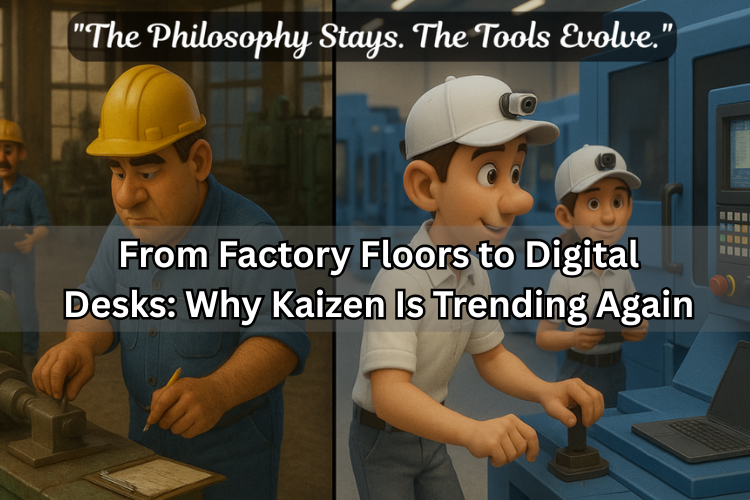The term Kaizen might have originated in post-war manufacturing, but its core idea—continuous improvement driven by everyone in the organization—couldn’t be more relevant in 2025. In a time of digital acceleration, hybrid workforces, and sustainability targets, Kaizen offers a practical and people-first approach to problem-solving.
1. Kaizen Enables Teams to Keep Up Without Burning Out
In 2025, most teams work under constant pressure to deliver more, faster. Kaizen’s focus on small, manageable changes helps organizations avoid the exhaustion that comes from chasing only big, disruptive innovations. A 2024 study from the Journal of Organizational Psychology found that teams using Kaizen practices reported 27% lower burnout rates compared to teams relying on reactive crisis-solving models.
Kaizen encourages calm, methodical progress—and that’s a strength in a business climate that often moves too fast for its good.
2. It’s a Framework That Grounds AI, Automation, and Tech Upgrades
Most businesses today have adopted tools like automation bots, AI-powered analytics, and workflow digitization. But tools alone don’t solve inefficiencies—what matters is how people use them. Kaizen provides the structure for deciding where to apply these technologies, tracking their outcomes, and improving them over time.
A 2025 case study from a logistics company in Bengaluru showed that using Kaizen to guide AI integration improved delivery accuracy by 19% and reduced decision errors because the human team was still engaged in improving the system continuously.
Kaizen doesn’t resist technology. It guides its proper use.
3. Kaizen Fits the New Work Culture: Hybrid, Transparent, Accountable
Today’s workforce is often spread across locations and time zones. One of the biggest challenges is maintaining shared purpose and consistent standards. Kaizen builds a habit of continuous discussion, reflection, and shared responsibility.
Tools like collaborative dashboards and team-based improvement logs make it easy to run Kaizen even in remote setups. A 2023 McKinsey report highlighted that companies with a culture of ongoing feedback and improvement saw higher productivity gains in hybrid teams. Kaizen provides a natural way to structure this culture.
4. What Can Be Changed? Make Kaizen Faster, Smarter, More Measurable
Kaizen isn’t a rigid set of rules—it’s a way of thinking. In 2025, companies are evolving how they practice Kaizen:
- Daily stand-up Kaizens instead of monthly review meetings
- Real-time feedback tools instead of paper suggestion boxes
- Data dashboards to measure improvements clearly
- Cross-functional involvement, not just operations or production
What doesn’t change is the philosophy: Everyone improves, all the time. What does change is the speed, the tools, and the visibility of impact.
5. It Helps Connect Strategy to Everyday Work
Most employees in large companies don’t always know how their work connects to the company’s goals. Kaizen solves that by encouraging every person to question, improve, and align their work with customer value.
In a 2024 retail sector study, stores using Kaizen-linked workflows had higher staff satisfaction and fewer customer complaints. This wasn’t because of automation—it was because employees knew what problems they were solving, and they were given space to fix them.
6. It Strengthens Accountability Without Micromanagement
Modern teams don’t respond well to top-down management. They want freedom with responsibility. Kaizen gives teams autonomy to fix what they see as inefficient, but within a clear improvement structure. Leaders don’t have to micromanage because the system encourages reporting, documentation, and results tracking.
This accountability-with-autonomy model is now used in IT teams, marketing departments, and even HR, far beyond its original use in production floors.
7. Kaizen Is a Driver for Sustainable Business Practices
In 2025, businesses are expected to reduce waste, cut emissions, and use fewer resources. Kaizen supports all of these through ongoing adjustments and smarter choices. A 2023 global study by UNIDO noted that manufacturing units applying “Green Kaizen” were better at meeting climate compliance standards, often reducing energy waste by over 20% annually.
This makes Kaizen not just a business tool but a sustainability enabler. Get your copy from KKBooks
8. It Builds a Long-Term Mindset in a Short-Term World
Today’s business world is obsessed with quarterly numbers. But companies that succeed over decades tend to focus on long-term improvement. Kaizen promotes patience, commitment, and quality. This is particularly valuable in sectors like publishing, healthcare, education, and social enterprises, where consistency and depth matter more than hype.
A study published in the Harvard Business Review in 2025 compared 150 organizations over five years and found that those using Kaizen-based methods were more consistent in terms of profit growth and team retention, even during economic slowdowns.
Kaizen Is Not an Old System—It’s a Modern Need
There’s nothing outdated about a team improving its work every day. What Kaizen offers is not a rigid formula but a mindset that matches today’s challenges: fast feedback, constant change, employee engagement, tech alignment, and purpose-driven work.
If anything, 2025’s fast-paced business climate makes Kaizen more relevant, not less.
Master this philosophy that stays with KKbooks.

